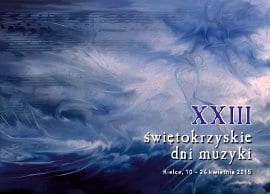Held in Kielce April 10-24, the Świętokrzyskie Music Days Festival was dedicated to new and rediscovered music. Two world premieres of works commissioned by the Kielce Philharmonic were also scheduled. They included Figury na piasku [Figures Drawn on Sand] for flute quartet by Grażyna Pstrokońska-Nawratil and Ideograms for Orchestra by Rafał Zapała, who is also the composer-in-residence for the current season of the Kielce Philharmonic.
Other programmed works included Rozmyślania przy fontannie [Daydreaming by a Fountain] for vibraphone and marimba by Maciej Malecki, Serenada by Zygmunt Krauze, Choroba na śmierć [A Deadly Illness] by Tomasz Sikorski, Go Dai Concerto by Marek Pasieczny, and a new work by Krzesimir Dębski, composed especially for music graduates participating in the Filharmonia! Ostrożnie wciąga [The Philharmonic! Perilously Addictive] program administered by the Institute of Music and Dance.
Other classics of modern symphonic literature, Lutosławski’s Symphony No. 3 and Górecki’s Symphony No. 3 were also heard during the Festival. The chamber side of its rich program offering also included Krzysztof Penderecki’s Flute Quartet and Paweł Mykietyn’s Epifora for Piano and Tape.
The rediscovered music on offer in Kielce included works by Franciszek Lessel, Zygmunt Noskowski, Władysław Żeleński, Józef Krogulski, Antoni Sztolpe, Antoni Rutkowski, and Witold Maliszewski. The final concert featured Karol Kurpiński’s Bitwa pod Możajskiem [The Battle of Możajsk], which is the precursor of Tchaikovsky’s 1812 Overture, although in Kurpiński’s case, he (expectedly but prematurely) celebrated Napoleon’s victory over the Tsarist army.
First inaugurated in the 1960s, this Festival was reinstated after a 30-year break by director Szymon Kawalla. Since 2002, the Świętokrzyskie Music Days Festival is directed by Jacek Rogala and the Festival’s main focus has been re-oriented towards Polish music, especially towards compositions heretofore not presented in Kielce’s main concert hall.
[Source: polmic.pl]
